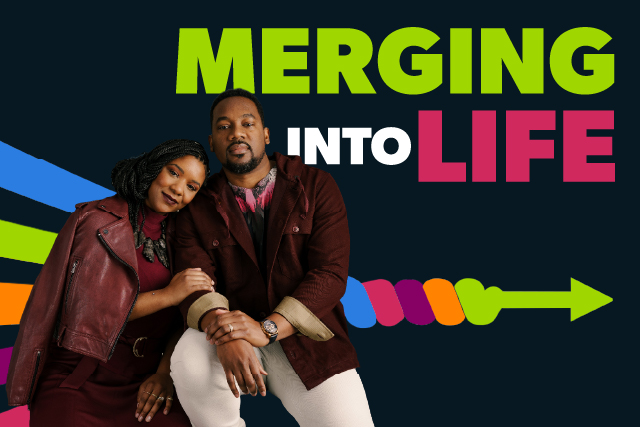SEASON 2: EPISODE 3
Episode Feedback
What you need to know about modern credit.
EPISODE SUMMARY
Buy now, pay later (BNPL) tools may feel convenient, but are they helping or hurting your financial future? In this episode of Merging Into Life, hosts Julien and Kiersten sit down with credit expert William Black to explore the pros and cons of BNPL and how new forms of consumer credit are reshaping our approach to debt management. From interest-free offers to BNPL’s sneaky impact on credit score, they unpack what makes these services different from traditional loans and why “frictionless” spending might be more dangerous than it seems. For anyone navigating student loans, car payments or just trying to understand modern credit, this episode is a crucial lesson in financial literacy for young adults.
KEY TAKEAWAYS
- Understanding how buy now, pay later works. It isn’t always free. Understanding interest rates (even hidden ones) is key.
- New credit reporting rules mean real consequences. Missed BNPL payments can now impact your credit score, even if the purchase was small.
- With multiple due dates tied to different purchases, effective debt management becomes harder, making it easy to lose track and fall behind.
- Building credit wisely starts early. Establishing good habits like paying on time and staying organized builds your credit profile and future borrowing power.
- If you’re struggling, don’t go silent. Negotiating with creditors is possible, and reaching out can lead to support, not punishment
TRANSCRIPT
[00:00:03] Julien: I hate to tell his business, but one of my closest friends was struggling to get a mortgage a few years ago. He finally was able to get it done. But as he was telling me some of the challenges that he was having, as it related to his credit score, I could not help but to recall so many of the issues that he had even when he was younger. Like he completely disregarded credit, and he wouldn’t pay his credit card bills, he wouldn’t pay his cellphone bills, back in the day. And, so, all of those little things, like when we were in our 20s, were definitely catching up to him.
[00:00:34] Kiersten: There are not many lessons in life that you have to learn the hard way, but I feel like credit kind of falls in there because it’s such a foreign concept. I was the same way. I understood it, intellectually. I knew I was supposed to follow these rules, pay on time. I did not fully understand how the consequences would ripple through every other decision for as long as they did. And so I was loose. I was reckless. I didn’t have a system. And I learned that lesson the hard ways. Things got very expensive very quickly.
[00:01:10] Julien: Hey everyone, welcome back to Merging into Life, the podcast where we’re helping you navigate real life moments with smarter financial choices, brought to you by AAA Northeast. I’m Julian. And I’m Kirsten.
[00:01:20] Kiersten: If you’ve been following this season, you know we’ve talked a lot about the emotional side of money, how it shows up in relationships, and how it affects the way we spend. Today, we’re looking at something that sits right at the intersection of emotion, convenience and risk. Buy now, pay later.
READ MORE
[00:01:35] Julien: If you’ve ever clicked pay in four at checkout or seen those little pop-ups offering interest-free payments, that’s BNPL, buy now pay later. And while it seems simple, there’s a lot going on behind the scenes, especially now with new credit reporting rules that could affect your score, even if you’re only splitting up a $40 hoodie. But it’s not just hoodies. This connects to the bigger financial choices we all make. Financing a car, taking student loans, buying a home or choosing credit over cash. These decisions carry weight, both practically and emotionally.
[00:02:06] Kiersten: We’re also going to look at how credit works and how it shapes the way that we think about money.
[00:02:10] Julien: Buy now, pay later isn’t really new, people have been using their credit cards to purchase products that they need to pay back later for a long time. So I’m looking forward to really digging into this discussion.
[00:02:20] Kiersten: We’re joined by William Black, a former managing director at Moody’s and someone with plenty of experience analyzing how loans work in the real world. So if you’ve ever wondered whether buying now and paying later is a smart choice or a slippery slope, this one is for you.
[00:02:39] Kiersten: Will, thank you for joining us. We gave a little bit of your bio, but if you want to give us some background on who you are and what you focus on, it would be great to start us off there.
[00:02:49] Will: The bulk of my professional career has been focused nearly exclusively on consumer credit. So here we’re talking about autos, credit cards, student loans and mortgages, where we focused on those asset, what we called asset classes, those consumer asset classes as they served as collateral or assets backing securities that are issued into the capital markets. So in order to do that, my team and myself, we had to understand how these businesses operate at a very granular level. As we know, two-thirds of the GDP of the economy’s growth is generated from consumer spending, and a lot of that is done on consumer credit.
[00:03:32] Kiersten: Have you found an easy way to explain how credit and interest rates work to the average consumer?
[00:03:41] Will: Credit is a responsibility that if you’re going to participate in the economy as a consumer, certainly in the U.S., is something you don’t have to participate in credit … but it sure is a useful tool. And whether or not you use credit, and almost all of us do, remember I mentioned credit cards, student loans, autos. We’re going to talk about buy now, pay later, which is a subsector of what I think of as unsecured consumer credit, which is credit cards, generally speaking, and mortgages if you want to own a home.
[00:19:22] Julien: What is the best way to just start building and establishing credit?
[00:19:23] One is just you’ve got to be in it to start building credit quickly. If you’re not in it, meaning if you don’t have credit, you’re still building a credit profile, whether you realize it or not. You’re just probably not helping yourself, because assumptions will be taken about you if you’re obtaining credit by the powers that be. Credit bureaus are tracking things like: What kind of credit do you have? How well are you paying down on that credit? How well are you paying it back? Are you delinquent? No. 2: How much credit a lender is likely to grant. And, No. 3, the cost of that credit will be affected by how high that credit score. The higher, the less chance you are going to default, the lower your APR or interest rate on that loan, which has major consequences. That’s some context I think is important to answer your question a little bit more directly. And that is, I mentioned, get in the ecosystem early, and you can do that somewhat safely. You’re not going to take out a mortgage when you’re a teenager, but what you might be able to get a buy now pay later when you’re buying something online. Just make sure that you pay it off on time. But you do, and once you or get a credit card, you might get what are called secured credit cards.
[00:05:42] Kiersten: I think very few people think about it like an ecosystem, like this critical part of our economy. There are all kinds of types of credit out there, whether we’re talking about credit cards, car loans, student debt, mortgages, and there are more things being invented along the way. I want to talk about buy now, pay later, because there’s a whole generation of people that will only know that as their primary loan or credit source. And I want to talk about what makes buy now, pay later or microloans different, and in some ways, more complicated than the traditional loans that we grew up on.
[00:06:18] Will: You’re right, buy now, pay later has been coming on the credit scene kind of fast and furious. They’re in the headlines. They’re getting a lot of attention. They’re relatively new, and they’re also relatively small. Let me put it into context. I mentioned earlier the main categories of consumer credit. Mortgages being the largest. I’m going to throw some numbers at you, but I’ll try to keep it simple. [There’s] about $13 trillion worth of mortgage, residential mortgage debt, outstanding in the country today. OK. Autos and student loans, 1.6 trillion each, each, outstanding. And credit cards as a category are about, I think, $1.2 trillion of credit card receivables outstanding, balances outstanding. Snapshot. BNPL is as best as I can determine, about $120 billion. It’s about 10% of just of just credit cards. So again, it’s been growing very, very fast. And that’s when we see a high rate of growth attached and you’re seeing new players who are very good at getting attention for their growth. They’re in the FinTech space and there’s a lot of attention given to FinTech. They’re growing fast. I would say that one of the things that BNPL does, they do a few things differently then let’s just compare them to credit cards. They’re both unsecured credit, meaning there’s no collateral backing it. They can’t take anything away after you bought it. Not like a car, like if you don’t pay back your car in 90 days, you’re late 90 days, they’re going to take your car back. So, it’s in that category of, of a loan, same as a credit card. No. 1, where they’re very different and where they were very successful, BNPL companies in general vs. a credit card, is that they were very good at becoming digitally native in the e-commerce ecosystem. That’s No. 1. The other thing that they did very well and are doing very well is they offer a product that is appealing in that it’s advertised as interest-free. Well, that sounds, that’s sounds awesome. Who, who doesn’t want an interest-free loan? And, of course, you and I know nothing is for free. Somebody is profiting from this arrangement, and it’s probably not you. Maybe that’s a bit of a cheap shot, because we can have a conversation and a debate about who’s truly paying for the cost of money, but we can agree that there is a cost to the time value of any loan. And that’s what this is. So who’s paying for that? You can make the argument, well, I’m not paying an interest rate. There’s no interest associated with my BNPL. So I’m paying any interest. That is true, nominally, but somebody’s paying for the time value of that money. And if it’s the lender, then they’re gonna get their chunk of change from the merchant. And the merchant is going to try to preserve their margins on what they’re selling. So, they’re going to charge you more for whatever they’re selling, maybe not you individually more, but they’re going to have to charge more to someone. It’s like squeezing a balloon, right? That, that air is going go somewhere.
[00:09:39] Kiersten: Let’s be real. Student loans can be one of the toughest topics for couples to navigate. Whether you’re paying them off, taking them on for a child or just trying to understand your options, it helps to have support. AAA offers access to student loan counseling and refinancing solutions designed to help members feel more in control of their financial future. Whether it’s guidance or a lower rate you’re after, we’re here to help. To explore your options visit AAA.com/studentloans. Services are available to AAA Northeast members. Availability and benefits may vary by club.
[00:10:14] Julien: I also remember one of the other things that made it very appealing when it started to roll out, what feels like a few years ago, was that it was not originally being reported on your credit report until recently, there’s been some news that now that is no longer the case.
[00:10:33] Will: I write a newsletter called Consumer Credit Matters that’s available on LinkedIn. And I wrote an article about this event very recently. So, you’re right to point out that, initially, whatever performance you did, good or bad, if you paid back your BNPL as on time or whether you defaulted on that BNPL, that credit behavior was not reported to what I mentioned earlier, the bureaus. And, therefore, did not then affect your score. This was causing some friction among the participants. This is a two double-edged sword, right? If you’re a good borrower and using BNPL, and they’re not being reported to the bureaus, you’re not helping your future self build a good credit bureau file and open doors for you down the road. But if you’re not a good borrower, that is, you can kind of escape that ecosystem without any penalty. That has now changed very recently that they will be working with at least some of those BNPL players and developing a statistical way of capturing that data.
[00:11:46] Kiersten: With these BNPLs, it’s like the due date is based on when the purchase was made. And so, the likelihood that you might miss a payment, not because you’re irresponsible, just because you have so many of them is a lot higher.
[00:11:57] Will: The thing you mentioned is an absolutely true truism of BNPL and how it differentiates itself from credit cards. And it makes it more difficult for the best organized among us to keep up with all these bills coming in throughout the month, as opposed to basically every other form of credit that I mentioned. Where you’re getting one bill a month. And often you can have those taken out of your checking account or your saving, whatever account on an automated basis. BNPL hasn’t been as easy. And by the way, it’s partly due to the fact that it started out as this is going to help you pay for this discretionary purchase that has a bigger ticket item than normal and compartmentalize it. And pay, I think, conceptually, in the early years, it was like, I’m going to buy this one thing that’s a little bit expensive, maybe a piece of furniture or something. And I and I get to pay it over four months instead of one month without any interest. That’s that was the thinking. Very attractive, right? And then, it turned into like being really pproliferated, and they’re ever present. And it’s awfully easy and tempting to hit the same button when you’re now maybe even checking out for groceries. Maybe you’re using for nondiscretionary purchases now. That is something that is happening. And yeah, you need to keep on top of it. You miss a payment, it’s going to hurt your credit score. Now how much, I don’t know. But it’s certainly it’s going to be immediate.
[00:13:27] Julien: What’s one thing that you do know for sure that you really just wish every young borrower knew about credit, whether it’s student loans, buying a car or buying now, pay later, what’s the one thing you just really wish every one of them knew?
[00:13:42] Will: You may not appreciate it when you start out, but credit is, as we started with this conversation, it’s a very important dimension of participating for most people. The vast majority of people, when you’re just starting out, it is and will and/or will be a very important dimension of participating in the economy. I guess it’s pretty simple. Pay back your debts on time. And don’t get in over your head. By the way, we should spend a little bit of time talking about getting in over your head, because bad things happen to good people. So, unemployment, health emergencies and divorce, I think are the top three reasons for people falling down in terms of their financial responsibilities. My advice to people there would be don’t go dark with your creditors. As difficult as it may be, get on the phone, or whatever your mode of communication is, with your lender and tell them what you’re going through, and tell them that you need help, and try to work something out. Most lenders, nowadays especially, will listen and offer you something, some forbearance, it depends on your circumstances and how you can substantiate it. So, don’t try to just turtle up, as the expression goes, and hope that this dark cloud will pass and that somehow people won’t catch up to you. Your debts are going to be, if you owe you something, those, those guys are not going to forget about it. I mean, you’re hearing about this in student loans now, right? I mean, I know this is a bit of a tangent, but it’s a good example. You owe a student loan to the federal government. They will come after you in Social Security years and garnish your Social Security if you owe them money. So you can run, but you cannot hide. And maybe you can run for many years, but you cannot hide.
[00:15:45] Julien: So I can’t just move to Belize, start an Airbnb and escape?
[00:15:48] Will: Maybe Belize might be an option. That might be an option. I’m not so sure how long the arms are, but I wouldn’t test it.
[00:15:57] Julien: I’d love to hear a little bit about your podcast.
[00:16:00] Will: I have a newsletter and a podcast. The newsletters, they go by the same name. They’re both called Consumer Credit Matters. And they’re just a platform for me to either discuss with, in the case of podcasts, discuss with market leaders in the world of consumer credit. And so that gives me a platform to either write about or talk about those types of events. Been fun, thanks for asking.
[00:16:24] Julien: No, thank you. Really appreciate you sharing your wealth of knowledge and understanding and experience on credit with us. And I’m sure all the listeners out there learn something as well.
[00:16:35] Will: Well, appreciate that. It was a wonderful conversation. Thank you so much for having me.
[00:16:42] Julien: You know, I really don’t want to demonize buy now, pay later. It does serve a purpose, but it’s really hard to not see it that way, when you know people are doing it to break up a $8 burrito into three different payments. Like I can understand it if we’re talking about a vacation or if in a case of an emergency. But when you start to see little things and kind of a flippant approach to it, I think that’s where the concern comes in.
[00:17:06] Kiersten: Yeah, my cousins, my younger cousins, almost treat it like a hack. Like it’s something that they know and that like we weren’t allowed to do when we were growing up. And they use it for everything. I think probably the craziest thing that I’ve heard that they use it for is gas. Did you know you could buy your gas now and pay for it later?
[00:17:22] Julien: I didn’t, but I’m not surprised.
[00:17:23] Kiersten: I was like, we used to just not go. Like if we didn’t have gas, we just weren’t going. And then, with all the options that you have between Uber and scooters, I just feel like there’s another alternative to breaking up a quarter tank into four different payments.
[00:17:37] Julien: Yeah, we used to ask for gas money, but I guess you don’t really need to do that if you got buy now, pay later. I love how these three episodes are really kind of connected in a way.
[00:17:48] Kiersten: Yeah, I was thinking about this the other night, and I realized the through line here is: the more invisible money becomes — like Fintech has this thing where they call it frictionless spending, you don’t have to touch physical paper or coins — the more visible money becomes, the more you actually have to think about it. And I don’t think we’ve caught up to that. In all three of our discussions, we’ve talked about the consciousness of money. How you have to think about how you feel before you spend it. How you think about your future purchasing decisions before you select buy now, pay later. And I don’t know that we’re used to doing that because before when it was physical it would just be gone. Like it was just subtraction, and now, it’s got like this calculus and algebra layer, the statistics layer, that is really advanced, and it changes the way that we should be teaching financial literacy and thinking about financial literacy.
[00:18:42] Julien: Yeah, it definitely feels like things are moving a lot faster, and we’re all kind of struggling to keep up with it. Big thanks to William for demystifying the world of credit and reminding us that even small financial decisions can leave a lasting impact.
[00:18:55] Kiersten: If this episode helped you rethink your own approach to borrowing, share it, leave a review, and don’t forget to subscribe on Apple, Spotify or wherever you listen. We’ll see you next time on Merging Into Life.
The views and opinions expressed in this podcast do not constitute financial advice and are not necessarily the views of AAA Northeast, AAA, and/or its affiliates.
RESOURCES
William Black | Consumer Credit Matters Newsletter
Merging Into Life, S1E7: Buying Your First Home
Merging Into Life, S1E19: How to Choose Your First Credit Card
How to Build Your Credit Score
How to Pre-Qualify for an Auto Loan
AAA Answers All Your Student Lending Questions
How to Consolidate Student Loans
Want to Learn More? Drop Us a Note
"*" indicates required fields
*The views and opinions expressed in this podcast are not necessarily the views of AAA Northeast, AAA and/or its affiliates.





